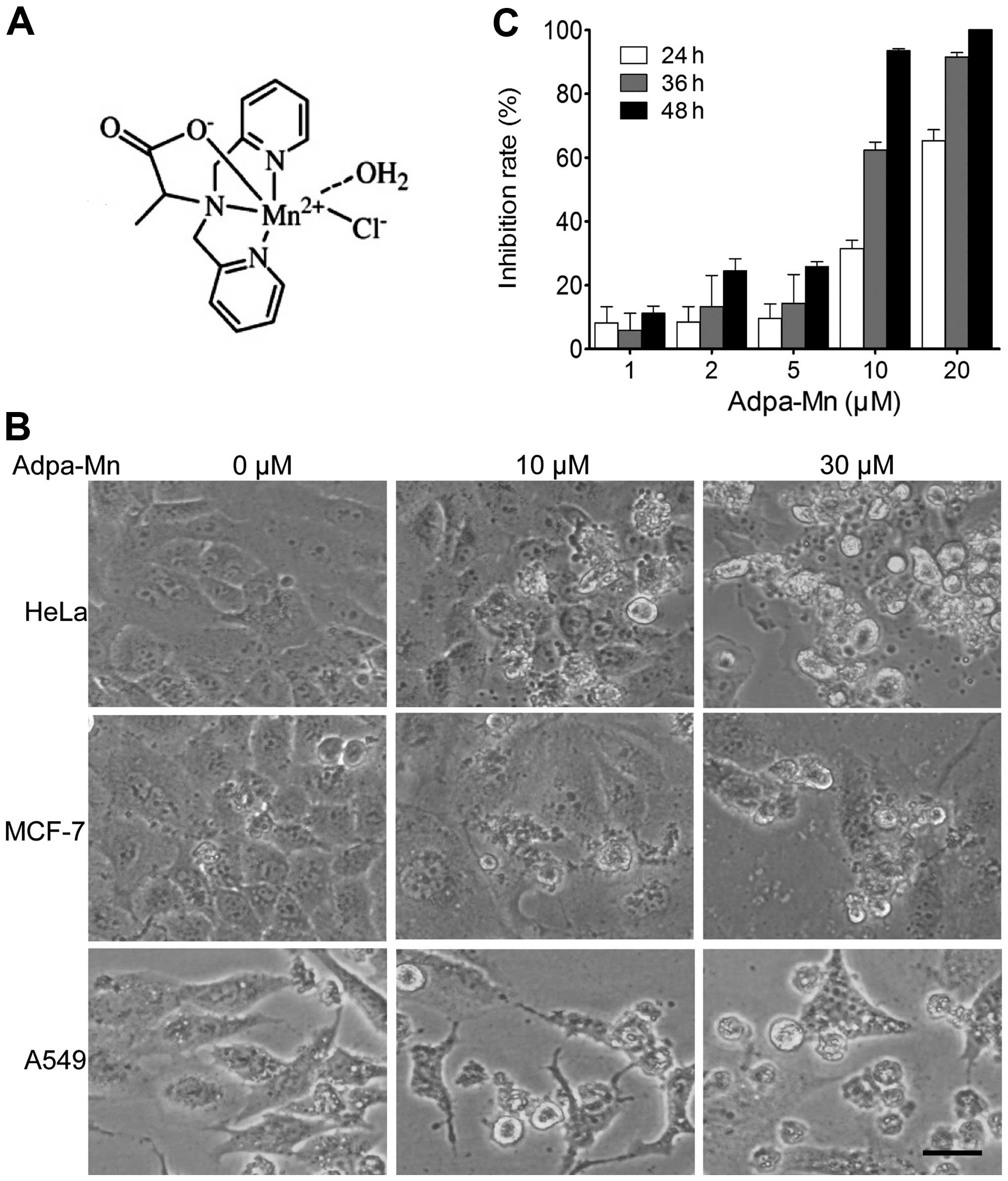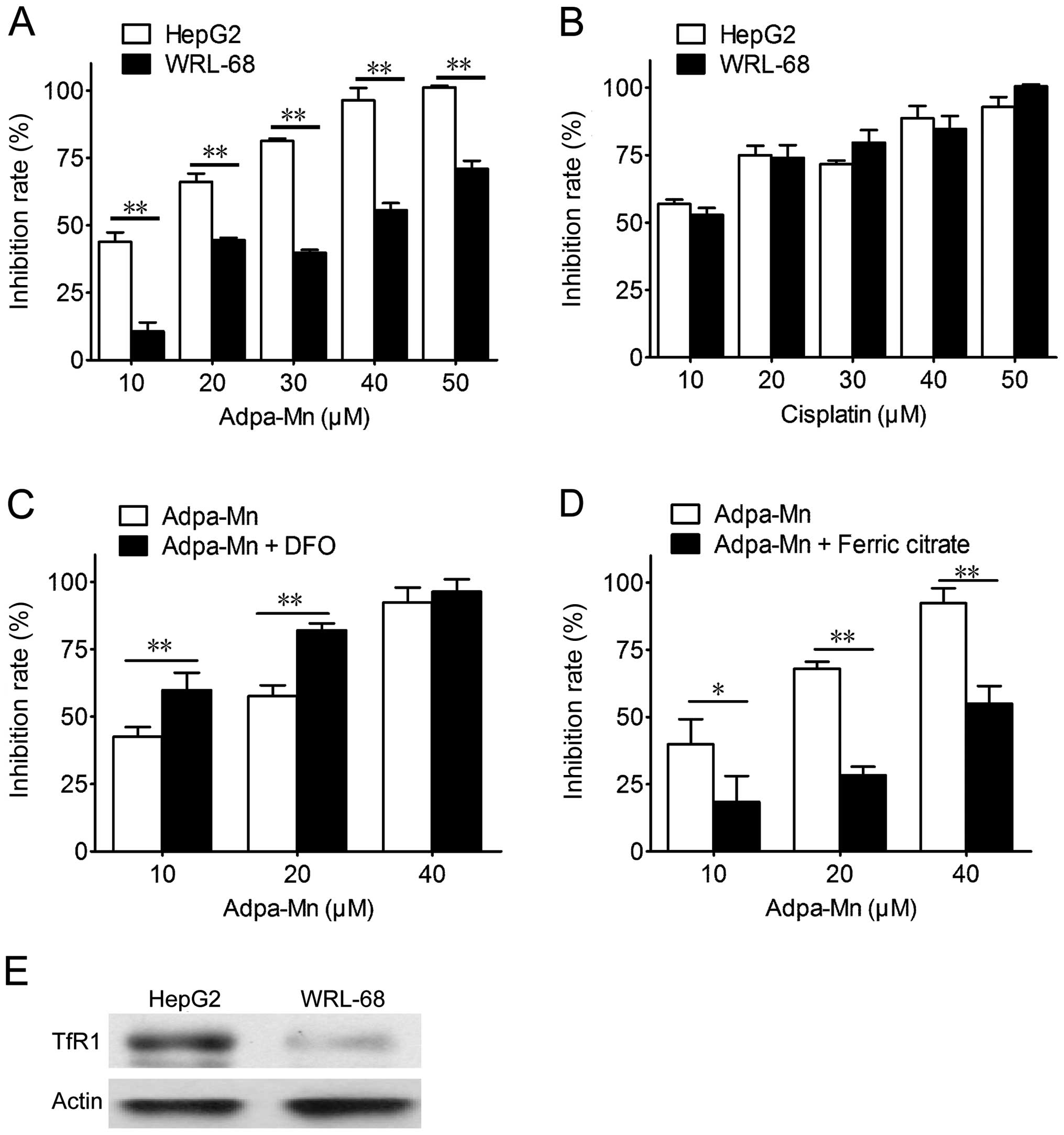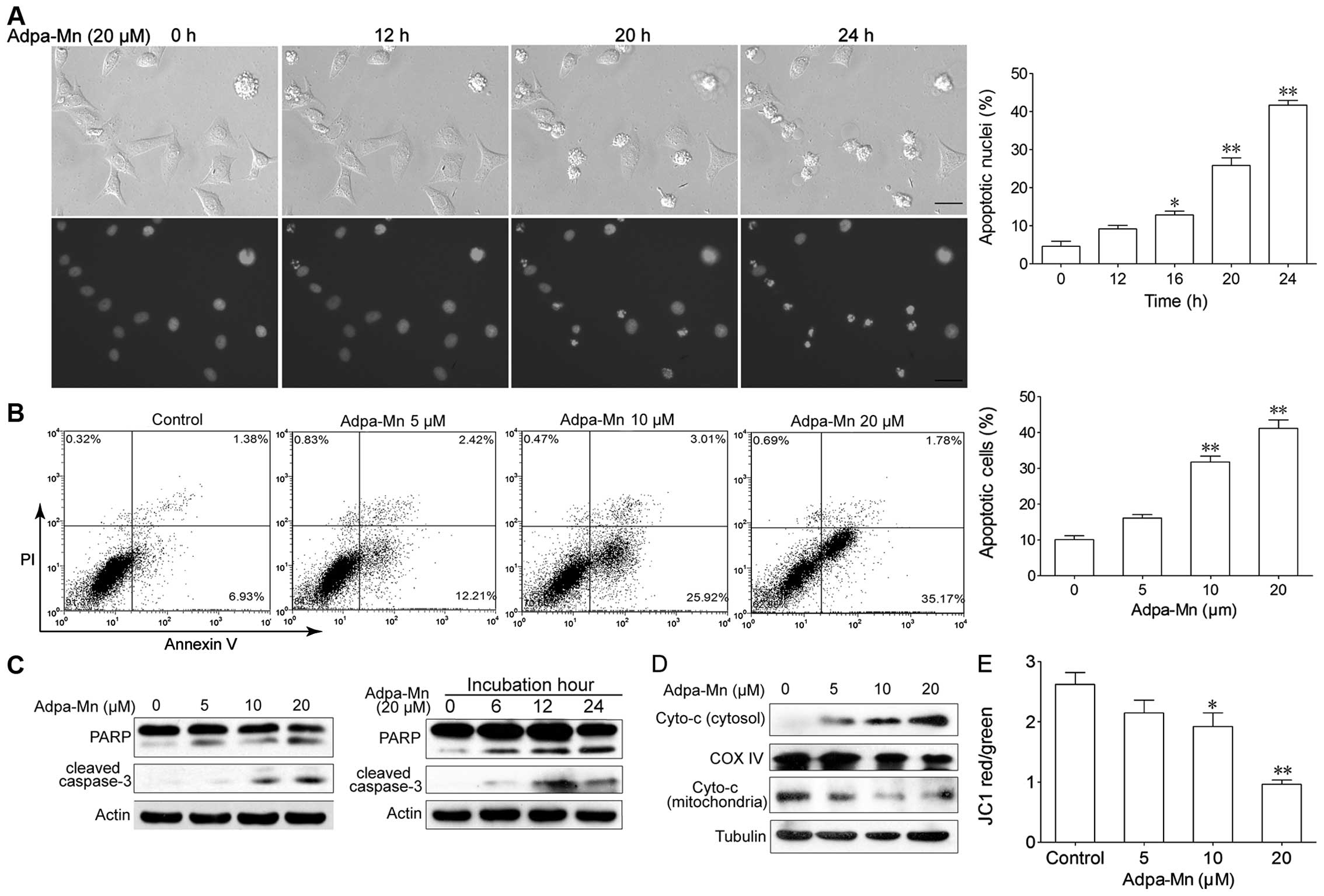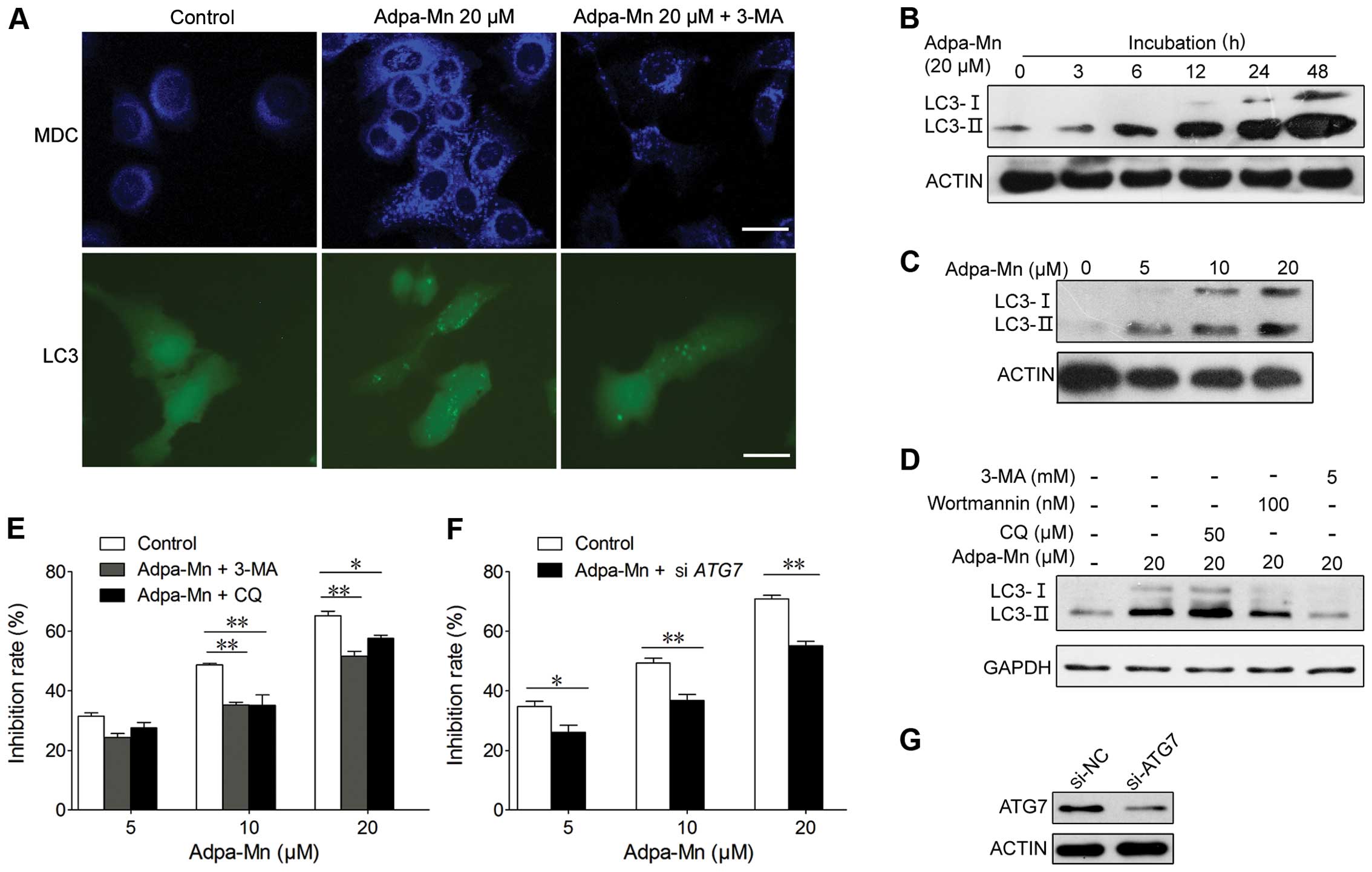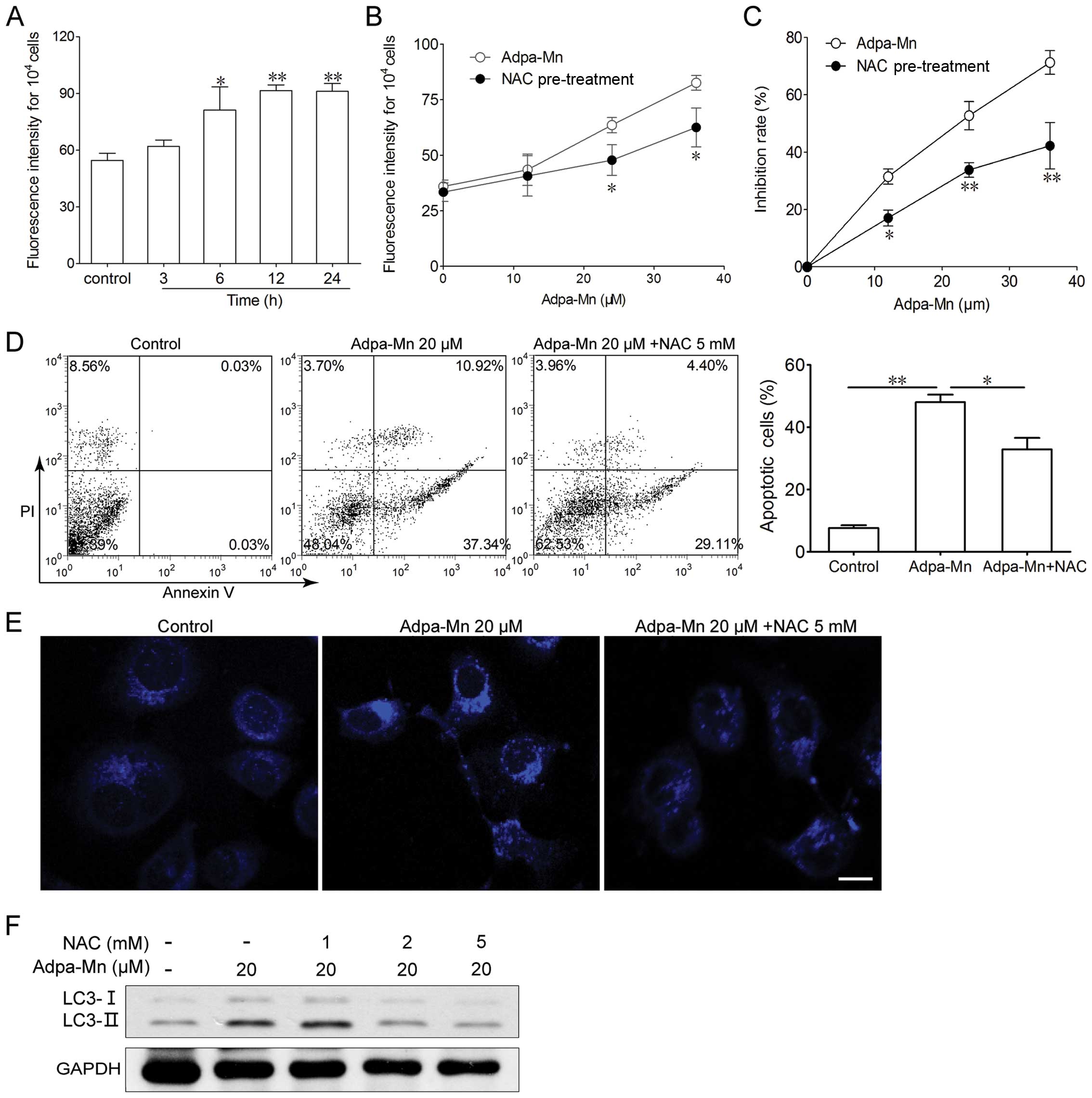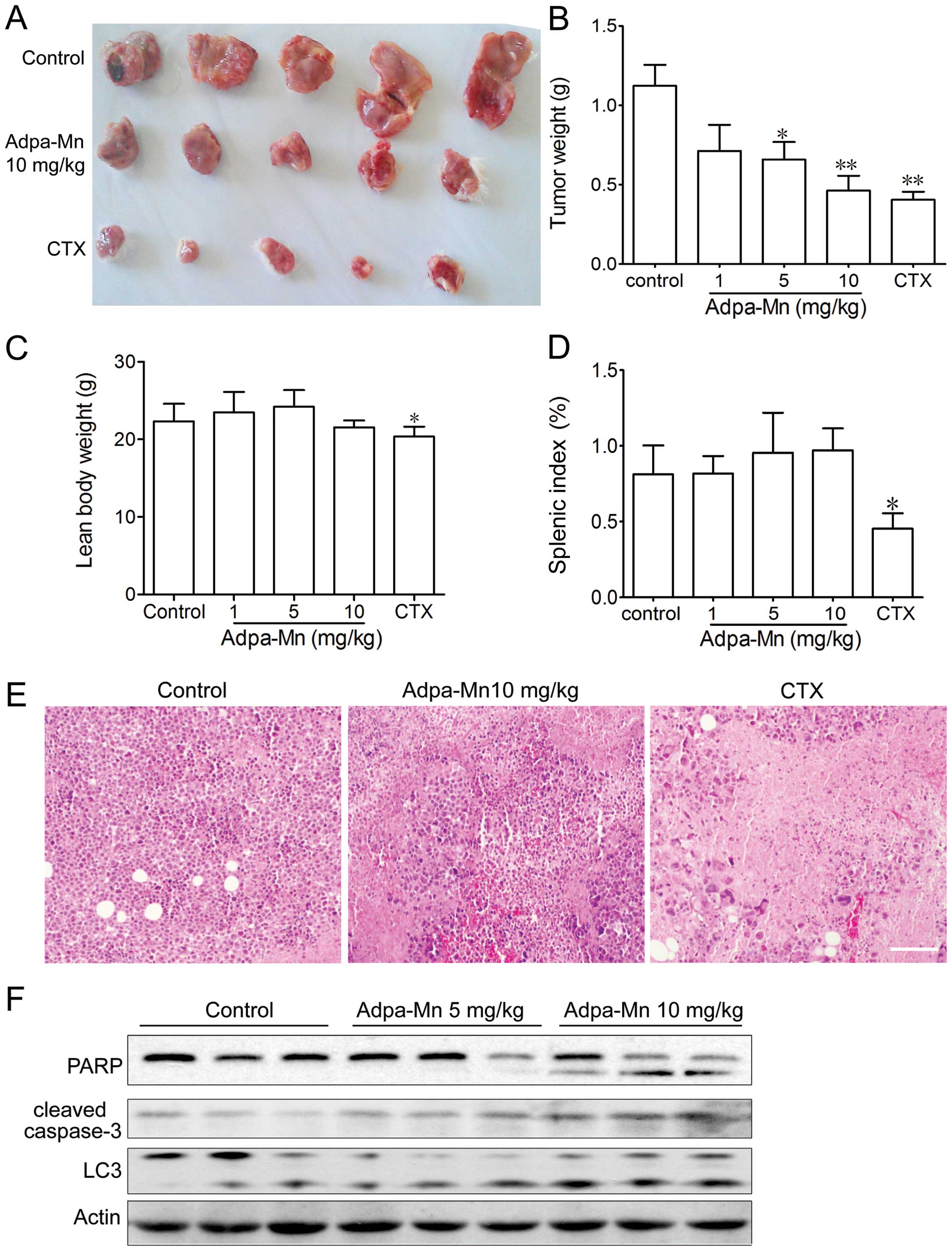|
1
|
Guo Z and Sadler PJ: Metals in Medicine.
Angew Chem Int Ed. 38:1512–1531. 1999. View Article : Google Scholar
|
|
2
|
Orvig C and Abrams MJ: Medicinal inorganic
chemistry: introduction. Chem Rev. 99:2201–2204. 1999. View Article : Google Scholar
|
|
3
|
Hartinger CG, Nazarov AA, Ashraf SM, Dyson
PJ and Keppler BK: Carbohydrate-metal complexes and their potential
as anticancer agents. Curr Med Chem. 15:2574–2591. 2008. View Article : Google Scholar : PubMed/NCBI
|
|
4
|
Chen D, Milacic V, Frezza M and Dou QP:
Metal complexes, their cellular targets and potential for cancer
therapy. Curr Pharm Des. 15:777–791. 2009. View Article : Google Scholar : PubMed/NCBI
|
|
5
|
Marzano C, Pellei M, Tisato F and Santini
C: Copper complexes as anticancer agents. Anticancer Agents Med
Chem. 9:185–211. 2009. View Article : Google Scholar : PubMed/NCBI
|
|
6
|
Ott I: On the medicinal chemistry of gold
complexes as anti cancer drugs. Coord Chem Rev. 253:1670–1681.
2009. View Article : Google Scholar
|
|
7
|
Timerbaev AR: Advances in developing
tris(8-quinolinolato) gallium(iii) as an anticancer drug: critical
appraisal and prospects. Metallomics. 1:193–198. 2009. View Article : Google Scholar
|
|
8
|
Kostova I: Titanium and vanadium complexes
as anticancer agents. Anticancer Agents in Med Chem. 9:827–842.
2009. View Article : Google Scholar
|
|
9
|
Zhang CX and Lippard SJ: New metal
complexes as potential therapeutics. Curr Opin Chem Biol.
7:481–489. 2003. View Article : Google Scholar : PubMed/NCBI
|
|
10
|
Rafique S, Idrees M, Nasim A, Akbar H and
Athar A: Transition metal complexes as potential therapeutic
agents. Biotech Mol Biol Rev. 5:38–45. 2010.
|
|
11
|
Wedler FC: Biological significance of
manganese in mammalian systems. Progress in Medicinal Chemistry.
Ellis GP and Luscombe DK: Elsevier; Cardiff: pp. 89–133. 1993,
View Article : Google Scholar
|
|
12
|
Aschner M, Guilarte TR, Schneider JS and
Zheng W: Manganese: recent advances in understanding its transport
and neurotoxicity. Toxicol and Appl Pharmacol. 221:131–147. 2007.
View Article : Google Scholar
|
|
13
|
Au C, Benedetto A and Aschner M: Manganese
transport in eukaryotes: the role of DMT1. Neurotoxicology.
29:569–576. 2008. View Article : Google Scholar : PubMed/NCBI
|
|
14
|
Calzolari A, Oliviero I, Deaglio S, et al:
Transferrin receptor 2 is frequently expressed in human cancer cell
lines. Blood Cells Mol Dis. 39:82–91. 2007. View Article : Google Scholar : PubMed/NCBI
|
|
15
|
Sciot R, Paterson AC, van Eyken P, Callea
F, Kew MC and Desmet VJ: Transferrin receptor expression in human
hepato-cellular carcinoma: an immunohistochemical study of 34
cases. Histopathology. 12:53–63. 1988. View Article : Google Scholar : PubMed/NCBI
|
|
16
|
Sciot R, Van Eyken P and Desmet VJ:
Transferrin receptor expression in benign tumours and in
hepatoblastoma of the liver. Histopathology. 16:59–62. 1990.
View Article : Google Scholar : PubMed/NCBI
|
|
17
|
El Mchichi B, Hadji A, Vazquez A and Leca
G: p38 MAPK and MSK1 mediate caspase-8 activation in
manganese-induced mitochondria-dependent cell death. Cell Death and
Differ. 14:1826–1836. 2007. View Article : Google Scholar
|
|
18
|
Oubrahim H, Stadtman ER and Chock PB:
Mitochondria play no roles in Mn(II)-induced apoptosis in HeLa
cells. Proc Natl Acad Sci USA. 98:9505–9510. 2001. View Article : Google Scholar : PubMed/NCBI
|
|
19
|
Kovala-Demertzi D, Hadjipavlou-Litina D,
Staninska M, Primikiri A, Kotoglou C and Demertzis MA:
Anti-oxidant, in vitro, in vivo anti-inflammatory activity and
antiproliferative activity of mefenamic acid and its metal
complexes with manganese(II), cobalt(II), nickel(II), copper(II)
and zinc(II). J Enzym Inhib Med Chem. 24:742–752. 2009. View Article : Google Scholar
|
|
20
|
Qiu-Yun C, Dong-Fang Z, Juan H, Wen-Jie G
and Jing G: Synthesis, anticancer activities, interaction with DNA
and mitochondria of manganese complexes. J Inorg Biochem.
11:1141–1417. 2010. View Article : Google Scholar
|
|
21
|
Amaravadi RK, Lippincott-Schwartz J, Yin
XM, et al: Principles and current strategies for targeting
autophagy for cancer treatment. Clin Cancer Res. 17:654–666. 2011.
View Article : Google Scholar : PubMed/NCBI
|
|
22
|
Liu EY and Ryan KM: Autophagy and cancer -
issues we need to digest. J Cell Sci. 125:2349–2358. 2012.
View Article : Google Scholar : PubMed/NCBI
|
|
23
|
Shen HM and Codogno P: Autophagic cell
death: Loch Ness monster or endangered species? Autophagy.
7:457–465. 2011. View Article : Google Scholar
|
|
24
|
Kondo Y and Kondo S: Autophagy and cancer
therapy. Autophagy. 2:85–90. 2006. View Article : Google Scholar : PubMed/NCBI
|
|
25
|
Mujumdar N and Saluja AK: Autophagy in
pancreatic cancer: an emerging mechanism of cell death. Autophagy.
6:997–998. 2010. View Article : Google Scholar : PubMed/NCBI
|
|
26
|
Yu L, Alva A, Su H, et al: Regulation of
an ATG7-beclin 1 program of autophagic cell death by caspase-8.
Science. 304:1500–1502. 2004. View Article : Google Scholar : PubMed/NCBI
|
|
27
|
Rubinsztein DC, Gestwicki JE, Murphy LO
and Klionsky DJ: Potential therapeutic applications of autophagy.
Nat Rev Drug Discov. 6:304–312. 2007. View Article : Google Scholar : PubMed/NCBI
|
|
28
|
Liu B, Cheng Y, Zhang B, Bian HJ and Bao
JK: Polygonatum cyrtonema lectin induces apoptosis and autophagy in
human melanoma A375 cells through a mitochondria-mediated
ROS-p38-p53 pathway. Cancer letters. 275:54–60. 2009. View Article : Google Scholar
|
|
29
|
Ghavami S, Eshragi M, Ande SR, et al:
S100A8/A9 induces autophagy and apoptosis via ROS-mediated
cross-talk between mitochondria and lysosomes that involves BNIP3.
Cell Res. 20:314–331. 2010. View Article : Google Scholar
|
|
30
|
Biederbick A, Kern HF and Elsässer HP:
Monodansylcadaverine (MDC) is a specific in vivo marker for
autophagic vacuoles. Eur J Cell Biol. 66:3–14. 1995.PubMed/NCBI
|
|
31
|
Klionsky DJ, Abeliovich H, Agostinis P, et
al: Guidelines for the use and interpretation of assays for
monitoring autophagy in higher eukaryotes. Autophagy. 4:151–175.
2008. View Article : Google Scholar : PubMed/NCBI
|
|
32
|
Ansari KI, Grant JD, Kasiri S, Woldemariam
G, Shrestha B and Mandal SS: Manganese(III)-salens induce tumor
selective apoptosis in human cells. J Inorg Biochem. 103:818–826.
2009. View Article : Google Scholar : PubMed/NCBI
|
|
33
|
Hille A, Ott I, Kitanovic A, et al:
N,N’-Bis(salicylidene)-1,2-phenylenediamine]metal complexes with
cell death promoting properties. J Biol Inorg Chem. 14:711–725.
2009. View Article : Google Scholar : PubMed/NCBI
|
|
34
|
Chen QY, Huang J, Li JF and Gao J:
Synthesis, interaction with mitochondrial and cancer cells of a
dinuclear manganese(II) complex:
Mn2(Adpa)2Cl4. Chinese J Inorg
Chem. 24:1789–1793. 2008.(In Chinese).
|
|
35
|
Guo WJ, Ye SS, Cao N, Huang J, Gao J and
Chen QY: ROS-mediated autophagy was involved in cancer cell death
induced by novel copper(II) complex. Exp Toxicol Pathol.
62:577–582. 2010. View Article : Google Scholar
|
|
36
|
Chen QY, Huang J, Guo WJ and Gao J:
Synthesis, characterization, DNA interaction and cytotoxic
activities of copper complexes with ethyl
2-[bis(2-pyridylmethyl)amino]propionate. Spectrochim Acta A Mol
Biomol Spectrosc. 72:648–653. 2009. View Article : Google Scholar
|
|
37
|
Rajendiran V, Karthik R, Palaniandavar M,
et al: Mixed-ligand copper(II)-phenolate complexes: effect of
coligand on enhanced DNA and protein binding, DNA cleavage, and
anticancer activity. Inorg Chem. 46:8208–8221. 2007. View Article : Google Scholar : PubMed/NCBI
|
|
38
|
Selvakumar B, Rajendiran V, Uma Maheswari
P, Stoeckli-Evans H and Palaniandavar M: Structures, spectra, and
DNA-binding properties of mixed ligand copper(II) complexes of
iminodiacetic acid: The novel role of diimine co-ligands on DNA
conformation and hydrolytic and oxidative double strand DNA
cleavage. J Inorg Biochem. 100:316–330. 2006. View Article : Google Scholar : PubMed/NCBI
|
|
39
|
Dhar S, Nethaji M and Chakravarty AR: DNA
cleavage on photoexposure at the d-d band in ternary copper(II)
complexes using red-light laser. Inorg Chem. 45:11043–11050. 2006.
View Article : Google Scholar : PubMed/NCBI
|
|
40
|
Shibata S, Maeda M, Furuta K, et al:
Neuroprotective effects of (arylthio)cyclopentenone derivatives on
manganese-induced apoptosis in PC12 cells. Brain Res. 1294:218–225.
2009. View Article : Google Scholar : PubMed/NCBI
|
|
41
|
Sun SY, Hail N Jr and Lotan R: Apoptosis
as a novel target for cancer chemoprevention. J Natl Cancer Inst.
96:662–672. 2004. View Article : Google Scholar : PubMed/NCBI
|
|
42
|
Qin LF and Ng IO: Induction of apoptosis
by cisplatin and its effect on cell cycle-related proteins and cell
cycle changes in hepatoma cells. Cancer Lett. 175:27–38. 2002.
View Article : Google Scholar
|
|
43
|
Moretti L, Yang ES, Kim KW and Lu B:
Autophagy signaling in cancer and its potential as novel target to
improve anticancer therapy. Drug Resist Updat. 10:135–143. 2007.
View Article : Google Scholar : PubMed/NCBI
|
|
44
|
Mathew R, Karantza-Wadsworth V and White
E: Role of autophagy in cancer. Nat Rev Cancer. 7:961–967. 2007.
View Article : Google Scholar : PubMed/NCBI
|
|
45
|
Klionsky DJ and Emr SD: Autophagy as a
regulated pathway of cellular degradation. Science. 290:1717–1721.
2000. View Article : Google Scholar : PubMed/NCBI
|
|
46
|
Galluzzi L, Maiuri MC, Vitale I, et al:
Cell death modalities: classification and pathophysiological
implications. Cell Death Differ. 14:1237–1243. 2007. View Article : Google Scholar : PubMed/NCBI
|
|
47
|
Iwamaru A, Kondo Y, Iwado E, et al:
Silencing mammalian target of rapamycin signaling by small
interfering RNA enhances rapamycin-induced autophagy in malignant
glioma cells. Oncogene. 26:1840–1851. 2006. View Article : Google Scholar : PubMed/NCBI
|
|
48
|
Zamzami N, Susin SA, Marchetti P, et al:
Mitochondrial control of nuclear apoptosis. J Exp Med.
183:1533–1544. 1996. View Article : Google Scholar : PubMed/NCBI
|
|
49
|
Kroemer G, Galluzzi L and Brenner C:
Mitochondrial membrane permeabilization in cell death. Physiol Rev.
87:99–163. 2007. View Article : Google Scholar : PubMed/NCBI
|
|
50
|
Chen Y, McMillan-Ward E, Kong J, Israels
SJ and Gibson SB: Oxidative stress induces autophagic cell death
independent of apoptosis in transformed and cancer cells. Cell
Death Differ. 15:171–182. 2008. View Article : Google Scholar
|
|
51
|
Scherz-Shouval R, Shvets E, Fass E, Shorer
H, Gil L and Elazar Z: Reactive oxygen species are essential for
autophagy and specifically regulate the activity of Atg4. EMBO J.
26:1749–1760. 2007. View Article : Google Scholar : PubMed/NCBI
|
|
52
|
Circu ML and Aw TY: Reactive oxygen
species, cellular redox systems, and apoptosis. Free Radic Biol
Med. 48:749–762. 2010. View Article : Google Scholar : PubMed/NCBI
|
|
53
|
Simon HU, Haj-Yehia A and Levi-Schaffer F:
Role of reactive oxygen species (ROS) in apoptosis induction.
Apoptosis. 5:415–418. 2000. View Article : Google Scholar
|
|
54
|
Schumacker PT: Reactive oxygen species in
cancer cells: live by the sword, die by the sword. Cancer Cell.
10:175–176. 2006. View Article : Google Scholar : PubMed/NCBI
|















